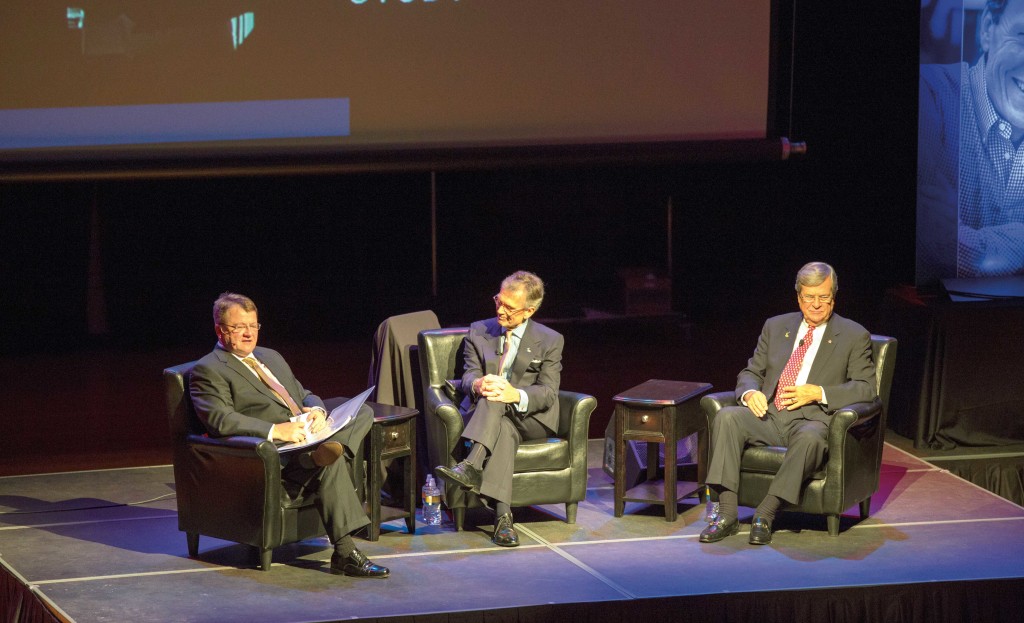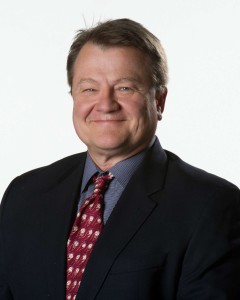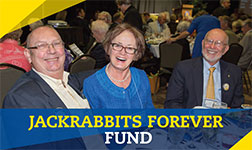
From left, Chuck Raasch ’76, Tom Daschle ’69 and Trent Lott sit on the stage at the Performing Arts Center. Raasch served as the moderator for the first Daschle Dialogues held Oct. 14.
On a cool October morning in a South Dakota State University government class, the former Republican leader of the United States Senate (sometimes called the world’s most deliberative body), warmed up his Mississippi drawl by reciting his high school graduation motto.
With his friend Tom Daschle nodding knowingly nearby (politicians have a good ear for when another’s signature line is coming) Trent Lott let flow the lines from Pascagoula, Mississippi, high school, 1959: “The glory is not in never failing, but in rising every time you fail.â€
Someday, all the sleepy eyes in that classroom audience will be opened to the value of that lesson.
It was the best civics lesson; a low-decibel addition to the shout and shout-over cacophony of modern politics, a moment where you recognize that history is filled with as many disappointments and failures as it is with soaring triumphs.
Every student should get that opportunity to connect history with those that helped shape it.
Daschle and Lott were on campus for the first of the Daschle Dialogues, to dedicate Daschle’s papers to the university, and to discuss “how and why to rebuild bipartisan bridges.†It’s been awhile since either was in office, but in comments throughout a day on campus and in a community forum that evening, both showed they were fully aware of the symbolism of two former political leaders from opposite sides of the ideological fence gathering close to the anniversary of the latest federal government shutdown.
Daschle papers—5.25 million documents, photos, artifacts and other mementos from Daschle’s years in public office—will be in a Briggs Library collection. I spent hours perusing them, and I hope others will, too. It’s a vast, collective window into a public life in one of history’s most transformative ages. It is raw history, containing everything from correspondence with state officials, to hate mail, to tender notes from fellow politicians, a fraternity that alone know the stresses and trials of public life in a 24/7 world.
Daschle’s donation shows the value of openness and transparency in a representative democracy—an illustration that, despite all of our collective challenges and disagreements, this kind of open discussion and critical examination is precisely what separates America from large swaths of the world now ruled by despots, dictators and terrorists.
Every citizen should peruse the hate mail file to see the vitriol routinely laid upon their public servants.
“I hope to see you with your hair bloody, eyes blackened, nose broken, and teeth knocked out,†a man from Daly City, California, wrote Daschle during one particularly contentious debate.
But the files also include a touching note from the aging warrior, Bob Dole, on the day that Daschle was named Senate Majority Leader.
“It’s a tough, challenging job,†Dole wrote, “otherwise, it would not be worth having.â€
The idea that America still has people willing to step into these jobs is of itself worthy of note.
I later moderated a Daschle-Lott conversation before a capacity crowd at the Performing Arts Center. It was a nostalgic night, with old partisan wounds healed and an enduring friendship apparent. Worry about the political dysfunction and ultimate hope for the future were discussed with equal conviction.
Backstage, before the event, you could tell it was a genuine friendship. As both men noshed on pretalk appetizers they raved about, they discussed the headlines of the day. Lott talked of hunting pheasant in South Dakota (and how Dakota cold got into Mississippi bones) and there were funny musings about why backstage “green rooms†were rarely painted green. It was the kind of comfortable conversation from two men from opposite sides of the country and opposite sides of the political spectrum, but whose blue-collar backgrounds and shared experiences united them.
Onstage, both men declared themselves worried about the partisanship and acrimony dividing the country, but both also expressed an innate optimism that they hoped would claw its way back into American discourse and governing.
Earlier, Daschle had told the government class that he believed that “ultimately, the American people are going to get tired†of gridlock and acrimony.
“This is America,†Lott told the class, “this, too shall pass.â€
Chuck Raasch ’76







